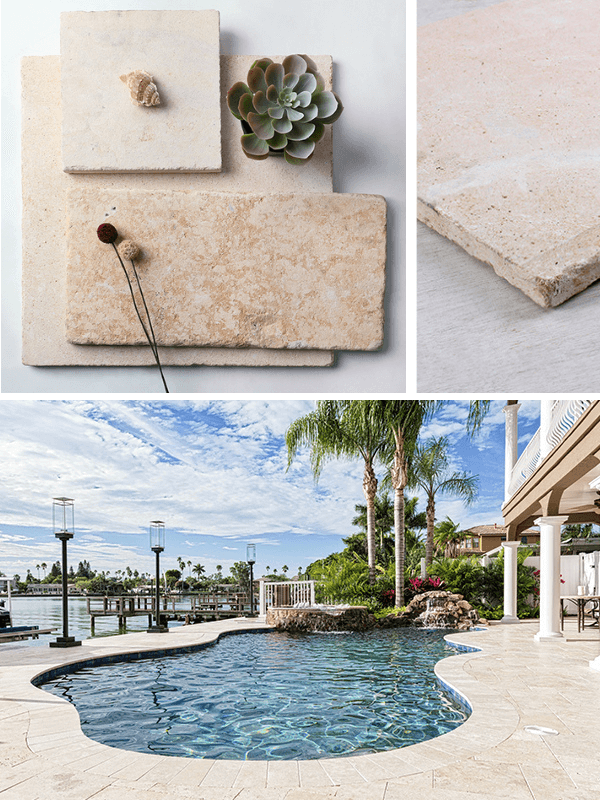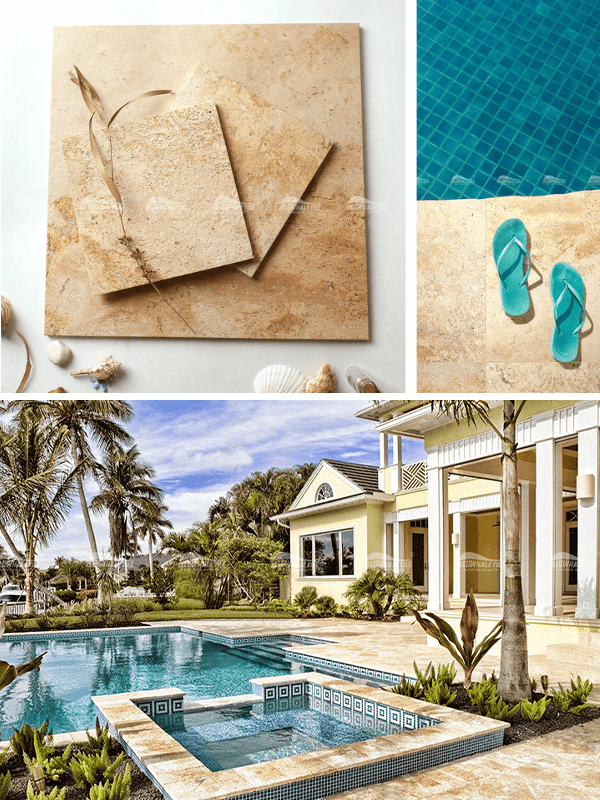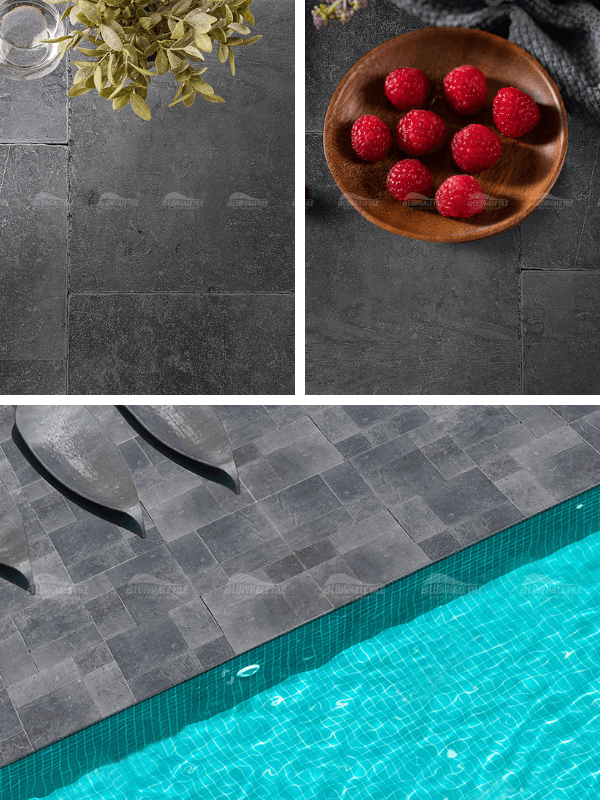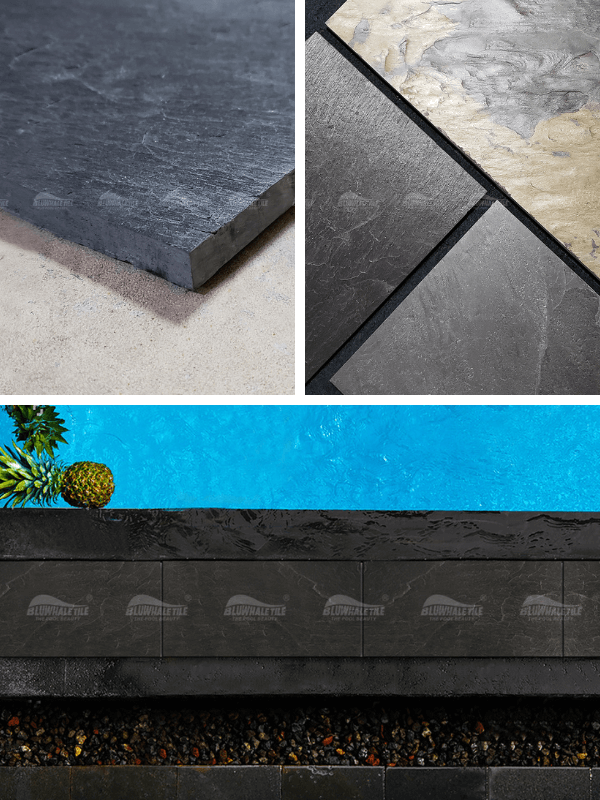
Swimming pools are a great addition to any home, providing a cool and refreshing retreat from the hot summer sun. But a pool is more than just water - it's also the area surrounding the pool, including the deck and the pool pavers. The pool pavers are the tiles that surround the pool, providing a durable and slip-resistant surface for swimmers to walk on. There are many types of pool pavers available, but in this article, we will focus on three popular options: travertine tile, limestone tile, and slate tile.
#1 Travertine Tile
Travertine Tile is a natural stone that is formed from calcium carbonate deposits. It is a type of limestone and is often found in hot springs and limestone caves. Travertine has a unique look and texture that sets it apart from other pool pavers. It has a porous surface that provides excellent slip resistance, even when wet. Travertine tiles come in a range of colors, from a light ivory to dark brown. They are available in several finishes, including polished, honed, brushed, and tumbled.

Featured Product: Natural Stone Travertine Tile ZOD2902
Travertine Tile is a hard-wearing yet beautiful stone. Its natural color variation hides marks and dirt. It is cool underfoot and offers high slip resistance. It is accurately sized, cuts well, and is easy to lay. The honed and filled finish is ideal to be used both inside and outside for a seamless look between these spaces.
One of the benefits of the travertine tile is that it is durable and long-lasting. It can withstand extreme temperatures and is resistant to fading and discoloration. However, because it is a natural stone, it requires some maintenance to keep it looking its best. Travertine should be sealed every few years to protect it from stains and moisture.

Featured Product: Natural Stone Travertine Tile ZOD2901
#2 Limestone Tile
Limestone is another natural stone that is often used for pool pavers. It is a sedimentary rock that is formed from the accumulation of organic materials and minerals. Limestone has a similar look to travertine but is generally lighter in color. It is available in shades of white, cream, and beige. Limestone tiles are also available in a variety of finishes, including honed, polished, and brushed.

Featured Product: 25mm Natural Stone Limestone Tile ZOD3001
One of the benefits of limestone tile is that it is relatively affordable compared to other natural stone options. It is also a durable and long-lasting material that can withstand the elements. However, like travertine, limestone is a porous material and requires regular sealing to protect it from moisture and stains.
#3 Slate Tile
Slate is a type of metamorphic rock that is formed from shale and clay. It is a durable and long-lasting material that is often used for outdoor applications. Slate has a unique texture and color that sets it apart from other natural stone options. It is available in a range of colors, including gray, green, black, and red. Slate tiles are available in several finishes, including honed, polished, and natural cleft.

Featured Product: 10mm Natural Stone Slate Tile ZOD3902
One of the benefits of slate tile is that it is extremely slip-resistant, even when wet. This makes it an ideal choice for pool pavers, where safety is a top priority. Slate is also a low-maintenance material that does not require sealing like travertine and limestone.
Tips: Choosing the Right Pool Paver
1. Style and Color
When choosing a pool paver, there are several factors to consider. The first is the style and color of the paver. Travertine and limestone are available in a range of colors, while slate is generally darker in color. Consider the overall style of your pool area and choose a paver that complements your aesthetic.
2. Slip-resistance
Another factor to consider is slip resistance. Pool pavers should be slip-resistant, even when wet, to prevent accidents and injuries. Travertine, limestone, and slate are all excellent options for slip-resistant pool pavers.
3. Maintenance
Maintenance is another important factor to consider. Travertine and limestone are porous materials that require regular sealing to protect them from stains and moisture. Slate, on the other hand, is a low-maintenance material that does not require sealing. Consider how much maintenance you are willing to do and choose a paver that fits your needs.
4. Cost
Finally, consider the cost of the paver. Travertine and limestone can be more expensive than slate, but they also offer unique textures and colors that may be worth the investment. Determine your budget and choose a paver that fits within it.
In conclusion, choosing the right pool paver is an important decision when building or renovating a pool. Travertine, limestone, and slate are all excellent options that offer durability, slip resistance, and unique textures and colors. Consider your style preferences, safety needs, maintenance requirements, and budget when choosing a pool paver that will enhance your pool area for years to come.
As a 17-year-old factory, Bluwhale Tile urges you to take action and choose the right pool paver for your home. Whether you opt for the unique textures of travertine, the affordability of limestone, or the slip-resistance of slate, selecting the right pool paver is crucial to creating a safe and stylish pool area that you can enjoy for years to come. Consider the factors we've outlined and make an informed decision that meets your needs and budget. Don't wait any longer - take the plunge and create your perfect pool oasis today. Contact us for free tile samples and inspirations!